Detailed Case Study: Analysis of ACCC v Optus Contract Law Principles
VerifiedAdded on 2022/12/29
|12
|3211
|1
Case Study
AI Summary
This case study analyzes the Australian Competition and Consumer Commission v Singtel Optus Pty Ltd case, focusing on contract law principles and the application of the Australian Consumer Law (ACL). The case involves Optus being penalized for issuing misleading advertisements to approximately 138,988 customers, falsely representing the necessity of acquiring a National Broadband Network (NBN) service to continue receiving broadband. The analysis examines the legal issues, including violations of sections 18, 29(1)(l), and 34 of the ACL, which relate to misleading and deceptive conduct, false representations, and misleading public perceptions of services. The document details the court's application of the law, the imposition of a pecuniary penalty of $5.26 million, and a critical analysis of the decision, highlighting the significance of protecting consumer interests and maintaining healthy market competition. The study emphasizes the objective test used by the court in determining misleading conduct, referencing relevant case precedents.
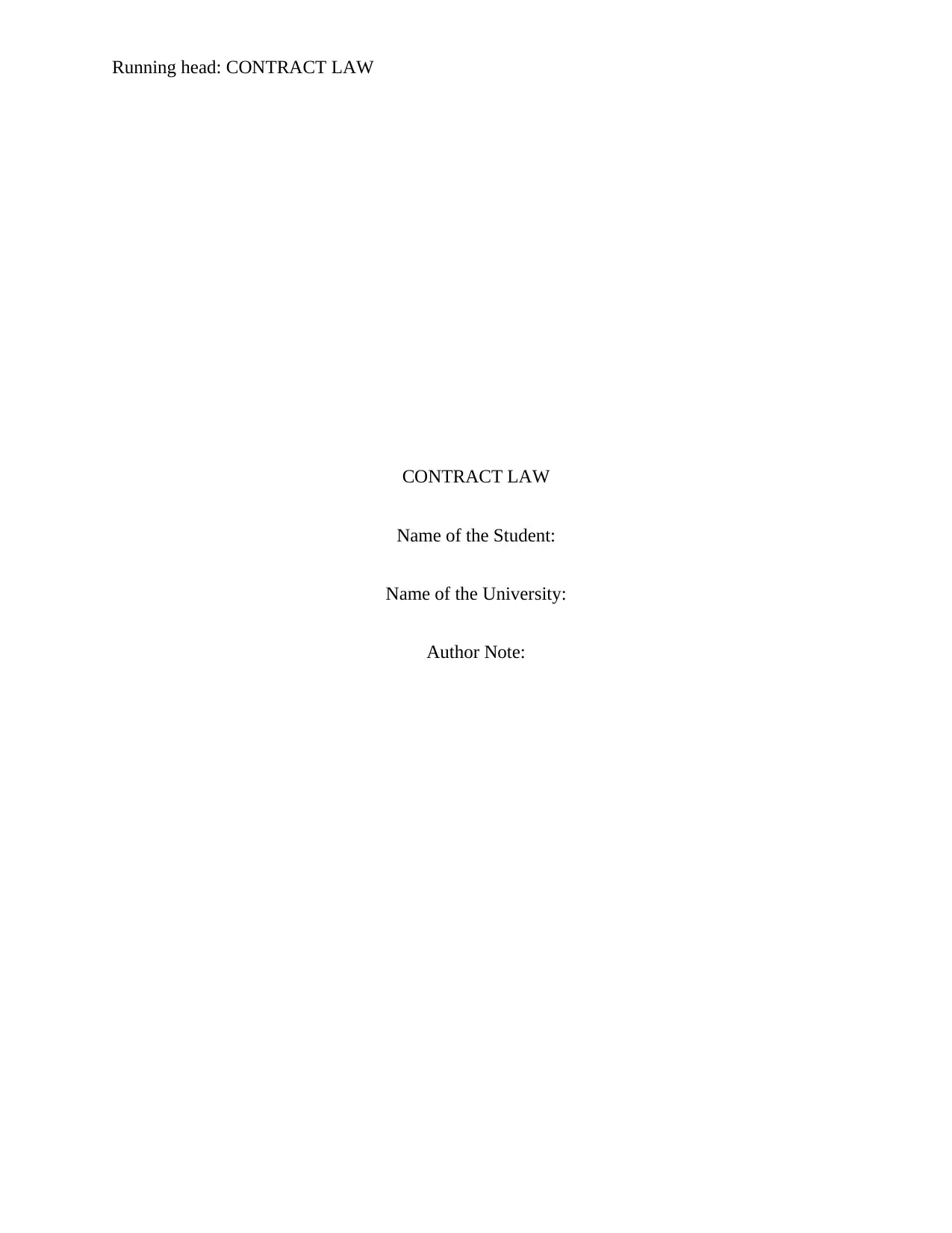
Running head: CONTRACT LAW
CONTRACT LAW
Name of the Student:
Name of the University:
Author Note:
CONTRACT LAW
Name of the Student:
Name of the University:
Author Note:
Paraphrase This Document
Need a fresh take? Get an instant paraphrase of this document with our AI Paraphraser
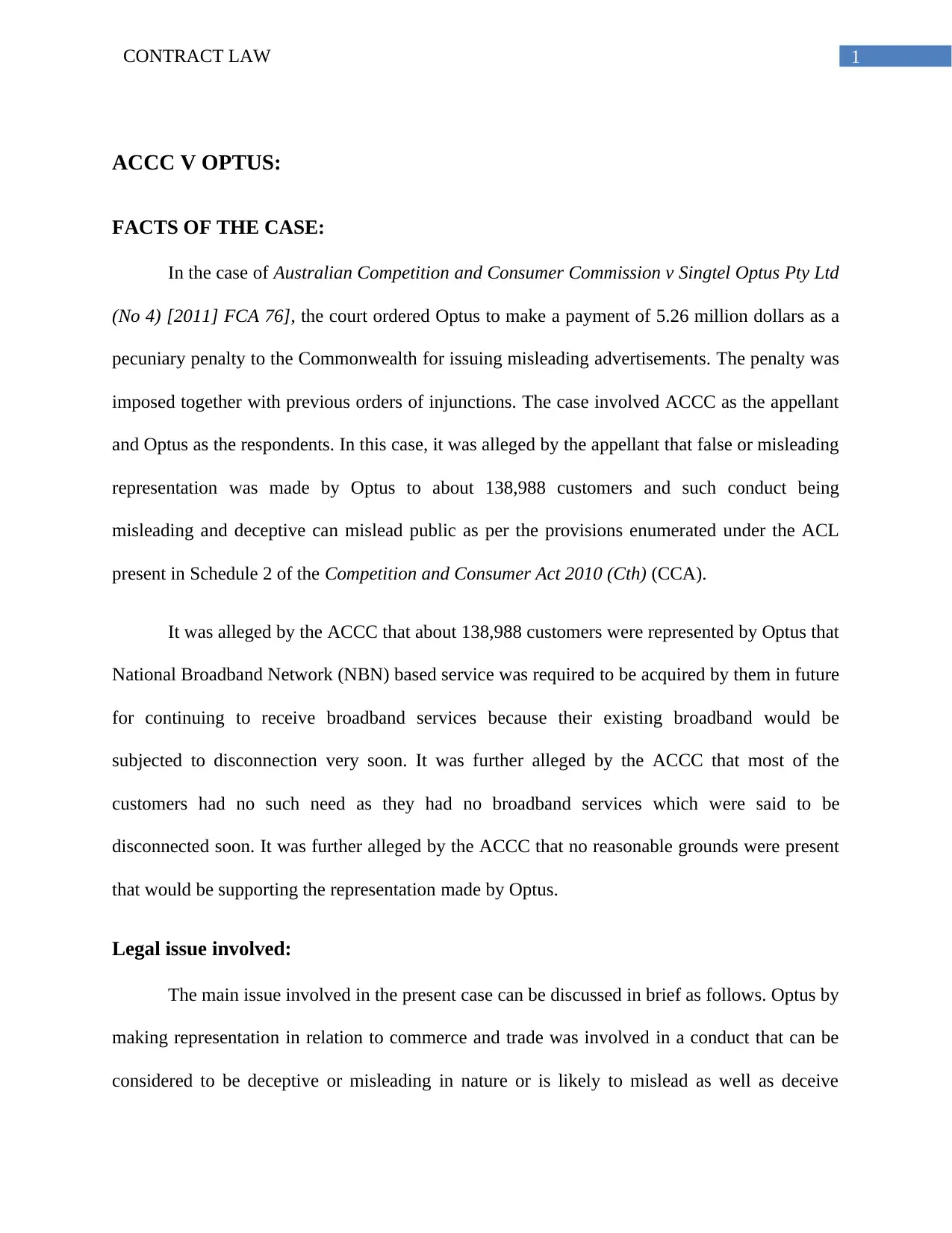
1CONTRACT LAW
ACCC V OPTUS:
FACTS OF THE CASE:
In the case of Australian Competition and Consumer Commission v Singtel Optus Pty Ltd
(No 4) [2011] FCA 76], the court ordered Optus to make a payment of 5.26 million dollars as a
pecuniary penalty to the Commonwealth for issuing misleading advertisements. The penalty was
imposed together with previous orders of injunctions. The case involved ACCC as the appellant
and Optus as the respondents. In this case, it was alleged by the appellant that false or misleading
representation was made by Optus to about 138,988 customers and such conduct being
misleading and deceptive can mislead public as per the provisions enumerated under the ACL
present in Schedule 2 of the Competition and Consumer Act 2010 (Cth) (CCA).
It was alleged by the ACCC that about 138,988 customers were represented by Optus that
National Broadband Network (NBN) based service was required to be acquired by them in future
for continuing to receive broadband services because their existing broadband would be
subjected to disconnection very soon. It was further alleged by the ACCC that most of the
customers had no such need as they had no broadband services which were said to be
disconnected soon. It was further alleged by the ACCC that no reasonable grounds were present
that would be supporting the representation made by Optus.
Legal issue involved:
The main issue involved in the present case can be discussed in brief as follows. Optus by
making representation in relation to commerce and trade was involved in a conduct that can be
considered to be deceptive or misleading in nature or is likely to mislead as well as deceive
ACCC V OPTUS:
FACTS OF THE CASE:
In the case of Australian Competition and Consumer Commission v Singtel Optus Pty Ltd
(No 4) [2011] FCA 76], the court ordered Optus to make a payment of 5.26 million dollars as a
pecuniary penalty to the Commonwealth for issuing misleading advertisements. The penalty was
imposed together with previous orders of injunctions. The case involved ACCC as the appellant
and Optus as the respondents. In this case, it was alleged by the appellant that false or misleading
representation was made by Optus to about 138,988 customers and such conduct being
misleading and deceptive can mislead public as per the provisions enumerated under the ACL
present in Schedule 2 of the Competition and Consumer Act 2010 (Cth) (CCA).
It was alleged by the ACCC that about 138,988 customers were represented by Optus that
National Broadband Network (NBN) based service was required to be acquired by them in future
for continuing to receive broadband services because their existing broadband would be
subjected to disconnection very soon. It was further alleged by the ACCC that most of the
customers had no such need as they had no broadband services which were said to be
disconnected soon. It was further alleged by the ACCC that no reasonable grounds were present
that would be supporting the representation made by Optus.
Legal issue involved:
The main issue involved in the present case can be discussed in brief as follows. Optus by
making representation in relation to commerce and trade was involved in a conduct that can be
considered to be deceptive or misleading in nature or is likely to mislead as well as deceive
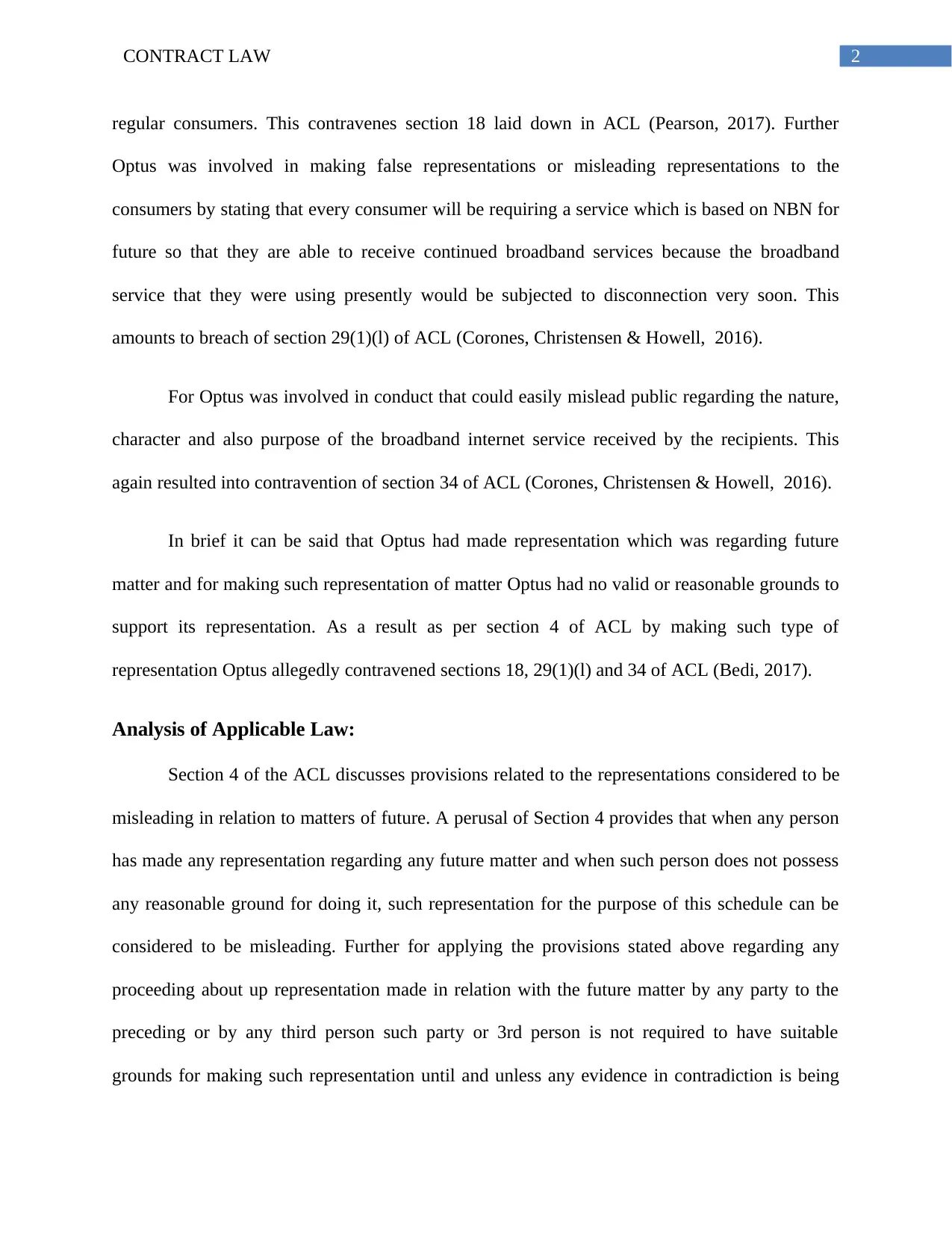
2CONTRACT LAW
regular consumers. This contravenes section 18 laid down in ACL (Pearson, 2017). Further
Optus was involved in making false representations or misleading representations to the
consumers by stating that every consumer will be requiring a service which is based on NBN for
future so that they are able to receive continued broadband services because the broadband
service that they were using presently would be subjected to disconnection very soon. This
amounts to breach of section 29(1)(l) of ACL (Corones, Christensen & Howell, 2016).
For Optus was involved in conduct that could easily mislead public regarding the nature,
character and also purpose of the broadband internet service received by the recipients. This
again resulted into contravention of section 34 of ACL (Corones, Christensen & Howell, 2016).
In brief it can be said that Optus had made representation which was regarding future
matter and for making such representation of matter Optus had no valid or reasonable grounds to
support its representation. As a result as per section 4 of ACL by making such type of
representation Optus allegedly contravened sections 18, 29(1)(l) and 34 of ACL (Bedi, 2017).
Analysis of Applicable Law:
Section 4 of the ACL discusses provisions related to the representations considered to be
misleading in relation to matters of future. A perusal of Section 4 provides that when any person
has made any representation regarding any future matter and when such person does not possess
any reasonable ground for doing it, such representation for the purpose of this schedule can be
considered to be misleading. Further for applying the provisions stated above regarding any
proceeding about up representation made in relation with the future matter by any party to the
preceding or by any third person such party or 3rd person is not required to have suitable
grounds for making such representation until and unless any evidence in contradiction is being
regular consumers. This contravenes section 18 laid down in ACL (Pearson, 2017). Further
Optus was involved in making false representations or misleading representations to the
consumers by stating that every consumer will be requiring a service which is based on NBN for
future so that they are able to receive continued broadband services because the broadband
service that they were using presently would be subjected to disconnection very soon. This
amounts to breach of section 29(1)(l) of ACL (Corones, Christensen & Howell, 2016).
For Optus was involved in conduct that could easily mislead public regarding the nature,
character and also purpose of the broadband internet service received by the recipients. This
again resulted into contravention of section 34 of ACL (Corones, Christensen & Howell, 2016).
In brief it can be said that Optus had made representation which was regarding future
matter and for making such representation of matter Optus had no valid or reasonable grounds to
support its representation. As a result as per section 4 of ACL by making such type of
representation Optus allegedly contravened sections 18, 29(1)(l) and 34 of ACL (Bedi, 2017).
Analysis of Applicable Law:
Section 4 of the ACL discusses provisions related to the representations considered to be
misleading in relation to matters of future. A perusal of Section 4 provides that when any person
has made any representation regarding any future matter and when such person does not possess
any reasonable ground for doing it, such representation for the purpose of this schedule can be
considered to be misleading. Further for applying the provisions stated above regarding any
proceeding about up representation made in relation with the future matter by any party to the
preceding or by any third person such party or 3rd person is not required to have suitable
grounds for making such representation until and unless any evidence in contradiction is being
⊘ This is a preview!⊘
Do you want full access?
Subscribe today to unlock all pages.

Trusted by 1+ million students worldwide
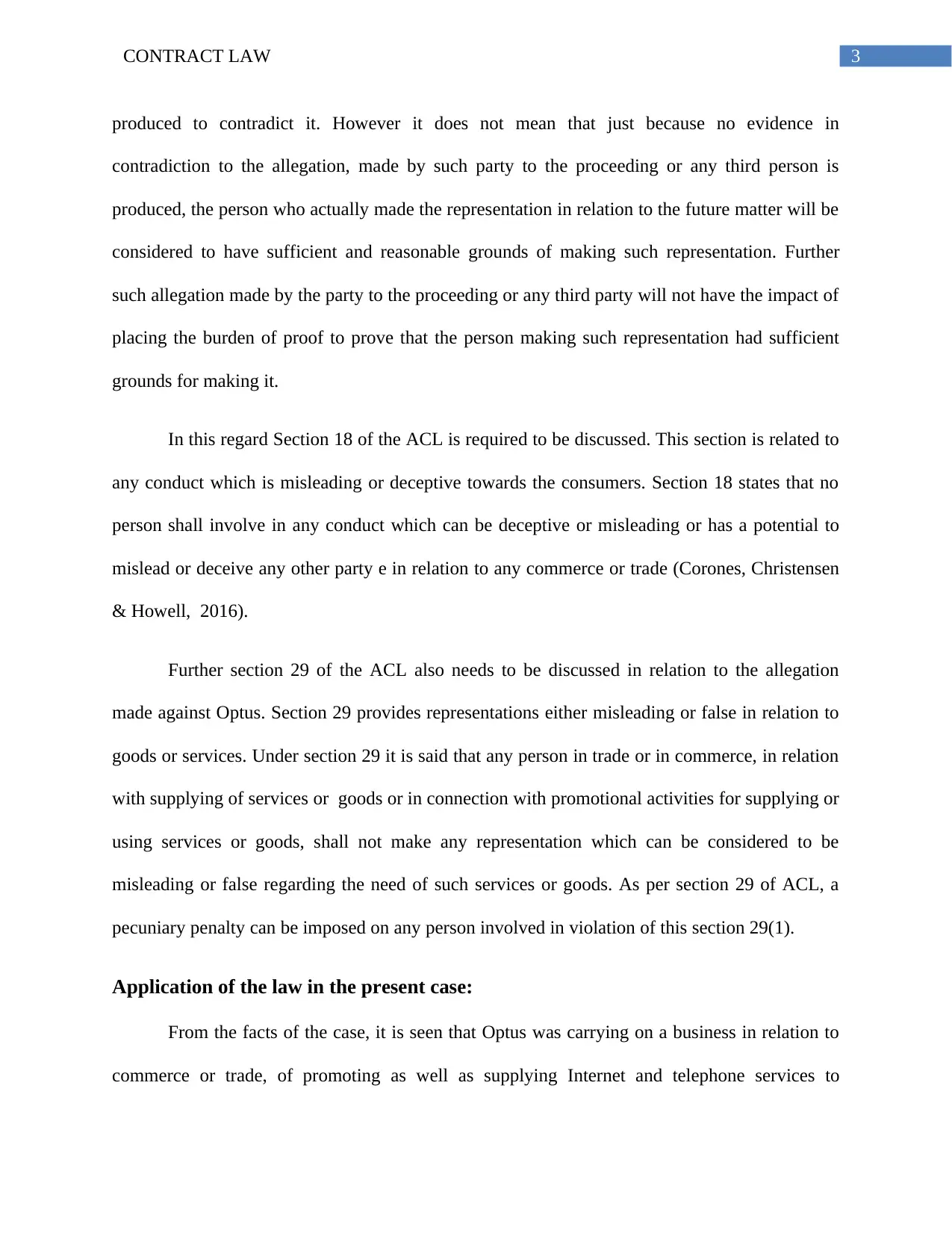
3CONTRACT LAW
produced to contradict it. However it does not mean that just because no evidence in
contradiction to the allegation, made by such party to the proceeding or any third person is
produced, the person who actually made the representation in relation to the future matter will be
considered to have sufficient and reasonable grounds of making such representation. Further
such allegation made by the party to the proceeding or any third party will not have the impact of
placing the burden of proof to prove that the person making such representation had sufficient
grounds for making it.
In this regard Section 18 of the ACL is required to be discussed. This section is related to
any conduct which is misleading or deceptive towards the consumers. Section 18 states that no
person shall involve in any conduct which can be deceptive or misleading or has a potential to
mislead or deceive any other party e in relation to any commerce or trade (Corones, Christensen
& Howell, 2016).
Further section 29 of the ACL also needs to be discussed in relation to the allegation
made against Optus. Section 29 provides representations either misleading or false in relation to
goods or services. Under section 29 it is said that any person in trade or in commerce, in relation
with supplying of services or goods or in connection with promotional activities for supplying or
using services or goods, shall not make any representation which can be considered to be
misleading or false regarding the need of such services or goods. As per section 29 of ACL, a
pecuniary penalty can be imposed on any person involved in violation of this section 29(1).
Application of the law in the present case:
From the facts of the case, it is seen that Optus was carrying on a business in relation to
commerce or trade, of promoting as well as supplying Internet and telephone services to
produced to contradict it. However it does not mean that just because no evidence in
contradiction to the allegation, made by such party to the proceeding or any third person is
produced, the person who actually made the representation in relation to the future matter will be
considered to have sufficient and reasonable grounds of making such representation. Further
such allegation made by the party to the proceeding or any third party will not have the impact of
placing the burden of proof to prove that the person making such representation had sufficient
grounds for making it.
In this regard Section 18 of the ACL is required to be discussed. This section is related to
any conduct which is misleading or deceptive towards the consumers. Section 18 states that no
person shall involve in any conduct which can be deceptive or misleading or has a potential to
mislead or deceive any other party e in relation to any commerce or trade (Corones, Christensen
& Howell, 2016).
Further section 29 of the ACL also needs to be discussed in relation to the allegation
made against Optus. Section 29 provides representations either misleading or false in relation to
goods or services. Under section 29 it is said that any person in trade or in commerce, in relation
with supplying of services or goods or in connection with promotional activities for supplying or
using services or goods, shall not make any representation which can be considered to be
misleading or false regarding the need of such services or goods. As per section 29 of ACL, a
pecuniary penalty can be imposed on any person involved in violation of this section 29(1).
Application of the law in the present case:
From the facts of the case, it is seen that Optus was carrying on a business in relation to
commerce or trade, of promoting as well as supplying Internet and telephone services to
Paraphrase This Document
Need a fresh take? Get an instant paraphrase of this document with our AI Paraphraser
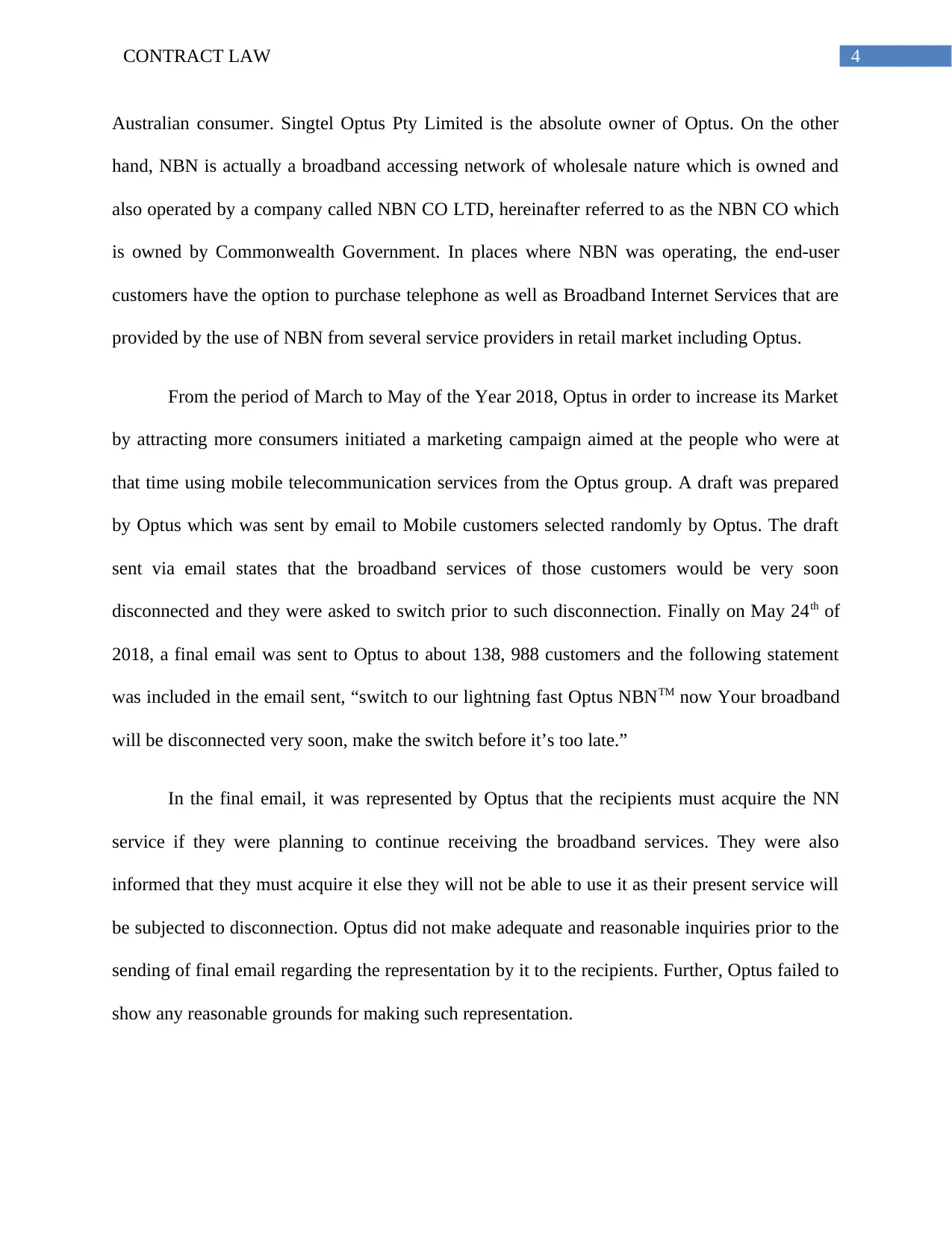
4CONTRACT LAW
Australian consumer. Singtel Optus Pty Limited is the absolute owner of Optus. On the other
hand, NBN is actually a broadband accessing network of wholesale nature which is owned and
also operated by a company called NBN CO LTD, hereinafter referred to as the NBN CO which
is owned by Commonwealth Government. In places where NBN was operating, the end-user
customers have the option to purchase telephone as well as Broadband Internet Services that are
provided by the use of NBN from several service providers in retail market including Optus.
From the period of March to May of the Year 2018, Optus in order to increase its Market
by attracting more consumers initiated a marketing campaign aimed at the people who were at
that time using mobile telecommunication services from the Optus group. A draft was prepared
by Optus which was sent by email to Mobile customers selected randomly by Optus. The draft
sent via email states that the broadband services of those customers would be very soon
disconnected and they were asked to switch prior to such disconnection. Finally on May 24th of
2018, a final email was sent to Optus to about 138, 988 customers and the following statement
was included in the email sent, “switch to our lightning fast Optus NBNTM now Your broadband
will be disconnected very soon, make the switch before it’s too late.”
In the final email, it was represented by Optus that the recipients must acquire the NN
service if they were planning to continue receiving the broadband services. They were also
informed that they must acquire it else they will not be able to use it as their present service will
be subjected to disconnection. Optus did not make adequate and reasonable inquiries prior to the
sending of final email regarding the representation by it to the recipients. Further, Optus failed to
show any reasonable grounds for making such representation.
Australian consumer. Singtel Optus Pty Limited is the absolute owner of Optus. On the other
hand, NBN is actually a broadband accessing network of wholesale nature which is owned and
also operated by a company called NBN CO LTD, hereinafter referred to as the NBN CO which
is owned by Commonwealth Government. In places where NBN was operating, the end-user
customers have the option to purchase telephone as well as Broadband Internet Services that are
provided by the use of NBN from several service providers in retail market including Optus.
From the period of March to May of the Year 2018, Optus in order to increase its Market
by attracting more consumers initiated a marketing campaign aimed at the people who were at
that time using mobile telecommunication services from the Optus group. A draft was prepared
by Optus which was sent by email to Mobile customers selected randomly by Optus. The draft
sent via email states that the broadband services of those customers would be very soon
disconnected and they were asked to switch prior to such disconnection. Finally on May 24th of
2018, a final email was sent to Optus to about 138, 988 customers and the following statement
was included in the email sent, “switch to our lightning fast Optus NBNTM now Your broadband
will be disconnected very soon, make the switch before it’s too late.”
In the final email, it was represented by Optus that the recipients must acquire the NN
service if they were planning to continue receiving the broadband services. They were also
informed that they must acquire it else they will not be able to use it as their present service will
be subjected to disconnection. Optus did not make adequate and reasonable inquiries prior to the
sending of final email regarding the representation by it to the recipients. Further, Optus failed to
show any reasonable grounds for making such representation.
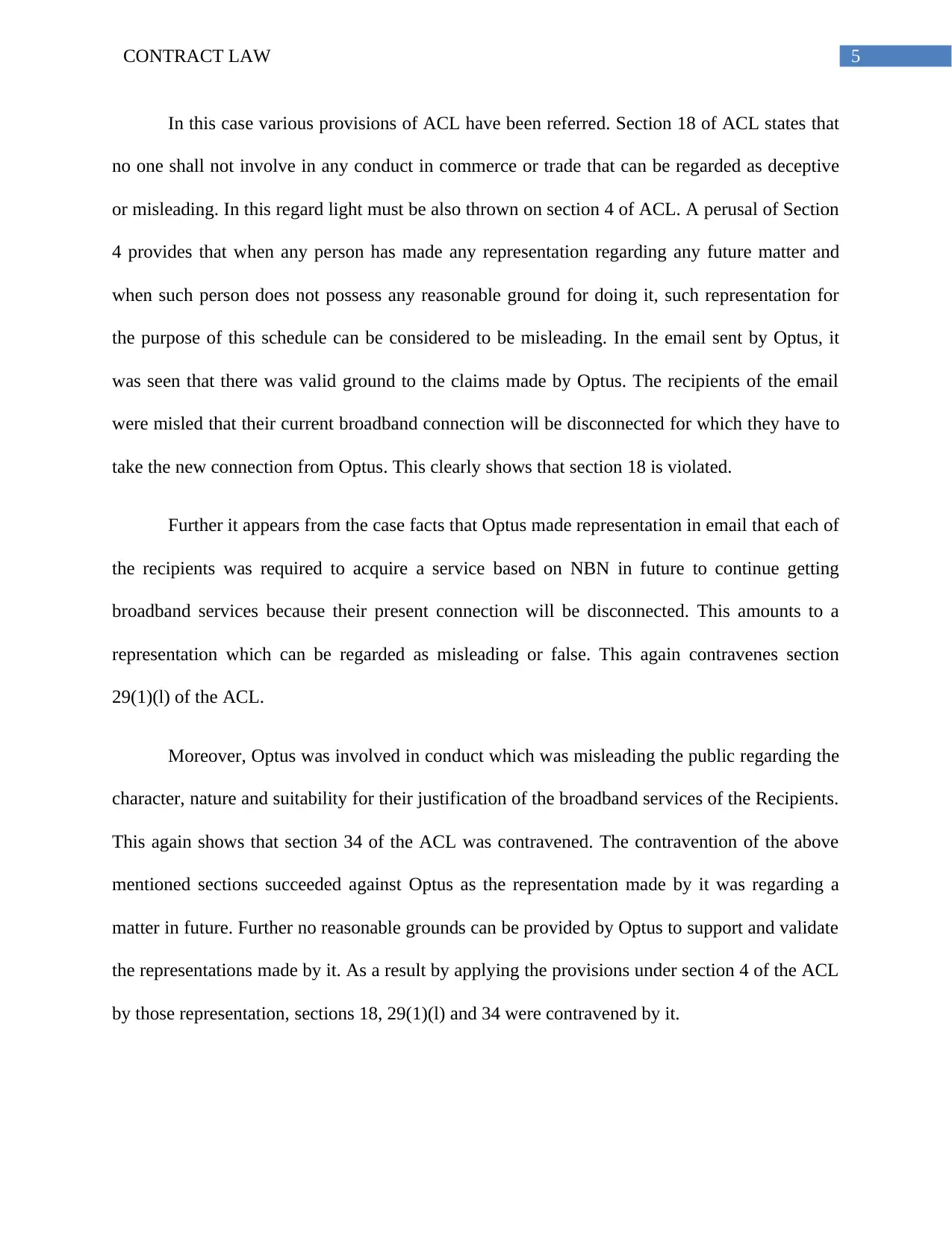
5CONTRACT LAW
In this case various provisions of ACL have been referred. Section 18 of ACL states that
no one shall not involve in any conduct in commerce or trade that can be regarded as deceptive
or misleading. In this regard light must be also thrown on section 4 of ACL. A perusal of Section
4 provides that when any person has made any representation regarding any future matter and
when such person does not possess any reasonable ground for doing it, such representation for
the purpose of this schedule can be considered to be misleading. In the email sent by Optus, it
was seen that there was valid ground to the claims made by Optus. The recipients of the email
were misled that their current broadband connection will be disconnected for which they have to
take the new connection from Optus. This clearly shows that section 18 is violated.
Further it appears from the case facts that Optus made representation in email that each of
the recipients was required to acquire a service based on NBN in future to continue getting
broadband services because their present connection will be disconnected. This amounts to a
representation which can be regarded as misleading or false. This again contravenes section
29(1)(l) of the ACL.
Moreover, Optus was involved in conduct which was misleading the public regarding the
character, nature and suitability for their justification of the broadband services of the Recipients.
This again shows that section 34 of the ACL was contravened. The contravention of the above
mentioned sections succeeded against Optus as the representation made by it was regarding a
matter in future. Further no reasonable grounds can be provided by Optus to support and validate
the representations made by it. As a result by applying the provisions under section 4 of the ACL
by those representation, sections 18, 29(1)(l) and 34 were contravened by it.
In this case various provisions of ACL have been referred. Section 18 of ACL states that
no one shall not involve in any conduct in commerce or trade that can be regarded as deceptive
or misleading. In this regard light must be also thrown on section 4 of ACL. A perusal of Section
4 provides that when any person has made any representation regarding any future matter and
when such person does not possess any reasonable ground for doing it, such representation for
the purpose of this schedule can be considered to be misleading. In the email sent by Optus, it
was seen that there was valid ground to the claims made by Optus. The recipients of the email
were misled that their current broadband connection will be disconnected for which they have to
take the new connection from Optus. This clearly shows that section 18 is violated.
Further it appears from the case facts that Optus made representation in email that each of
the recipients was required to acquire a service based on NBN in future to continue getting
broadband services because their present connection will be disconnected. This amounts to a
representation which can be regarded as misleading or false. This again contravenes section
29(1)(l) of the ACL.
Moreover, Optus was involved in conduct which was misleading the public regarding the
character, nature and suitability for their justification of the broadband services of the Recipients.
This again shows that section 34 of the ACL was contravened. The contravention of the above
mentioned sections succeeded against Optus as the representation made by it was regarding a
matter in future. Further no reasonable grounds can be provided by Optus to support and validate
the representations made by it. As a result by applying the provisions under section 4 of the ACL
by those representation, sections 18, 29(1)(l) and 34 were contravened by it.
⊘ This is a preview!⊘
Do you want full access?
Subscribe today to unlock all pages.

Trusted by 1+ million students worldwide
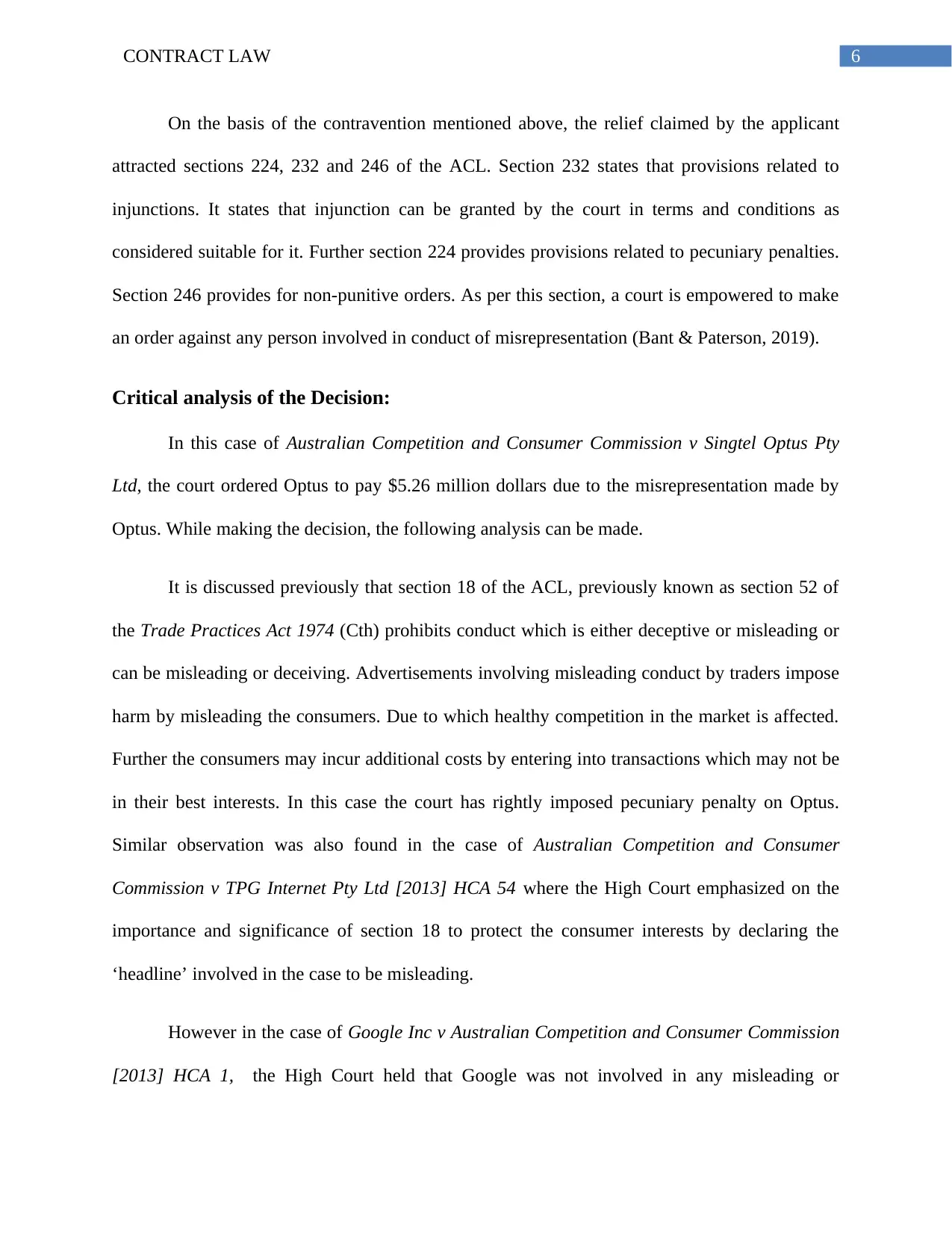
6CONTRACT LAW
On the basis of the contravention mentioned above, the relief claimed by the applicant
attracted sections 224, 232 and 246 of the ACL. Section 232 states that provisions related to
injunctions. It states that injunction can be granted by the court in terms and conditions as
considered suitable for it. Further section 224 provides provisions related to pecuniary penalties.
Section 246 provides for non-punitive orders. As per this section, a court is empowered to make
an order against any person involved in conduct of misrepresentation (Bant & Paterson, 2019).
Critical analysis of the Decision:
In this case of Australian Competition and Consumer Commission v Singtel Optus Pty
Ltd, the court ordered Optus to pay $5.26 million dollars due to the misrepresentation made by
Optus. While making the decision, the following analysis can be made.
It is discussed previously that section 18 of the ACL, previously known as section 52 of
the Trade Practices Act 1974 (Cth) prohibits conduct which is either deceptive or misleading or
can be misleading or deceiving. Advertisements involving misleading conduct by traders impose
harm by misleading the consumers. Due to which healthy competition in the market is affected.
Further the consumers may incur additional costs by entering into transactions which may not be
in their best interests. In this case the court has rightly imposed pecuniary penalty on Optus.
Similar observation was also found in the case of Australian Competition and Consumer
Commission v TPG Internet Pty Ltd [2013] HCA 54 where the High Court emphasized on the
importance and significance of section 18 to protect the consumer interests by declaring the
‘headline’ involved in the case to be misleading.
However in the case of Google Inc v Australian Competition and Consumer Commission
[2013] HCA 1, the High Court held that Google was not involved in any misleading or
On the basis of the contravention mentioned above, the relief claimed by the applicant
attracted sections 224, 232 and 246 of the ACL. Section 232 states that provisions related to
injunctions. It states that injunction can be granted by the court in terms and conditions as
considered suitable for it. Further section 224 provides provisions related to pecuniary penalties.
Section 246 provides for non-punitive orders. As per this section, a court is empowered to make
an order against any person involved in conduct of misrepresentation (Bant & Paterson, 2019).
Critical analysis of the Decision:
In this case of Australian Competition and Consumer Commission v Singtel Optus Pty
Ltd, the court ordered Optus to pay $5.26 million dollars due to the misrepresentation made by
Optus. While making the decision, the following analysis can be made.
It is discussed previously that section 18 of the ACL, previously known as section 52 of
the Trade Practices Act 1974 (Cth) prohibits conduct which is either deceptive or misleading or
can be misleading or deceiving. Advertisements involving misleading conduct by traders impose
harm by misleading the consumers. Due to which healthy competition in the market is affected.
Further the consumers may incur additional costs by entering into transactions which may not be
in their best interests. In this case the court has rightly imposed pecuniary penalty on Optus.
Similar observation was also found in the case of Australian Competition and Consumer
Commission v TPG Internet Pty Ltd [2013] HCA 54 where the High Court emphasized on the
importance and significance of section 18 to protect the consumer interests by declaring the
‘headline’ involved in the case to be misleading.
However in the case of Google Inc v Australian Competition and Consumer Commission
[2013] HCA 1, the High Court held that Google was not involved in any misleading or
Paraphrase This Document
Need a fresh take? Get an instant paraphrase of this document with our AI Paraphraser
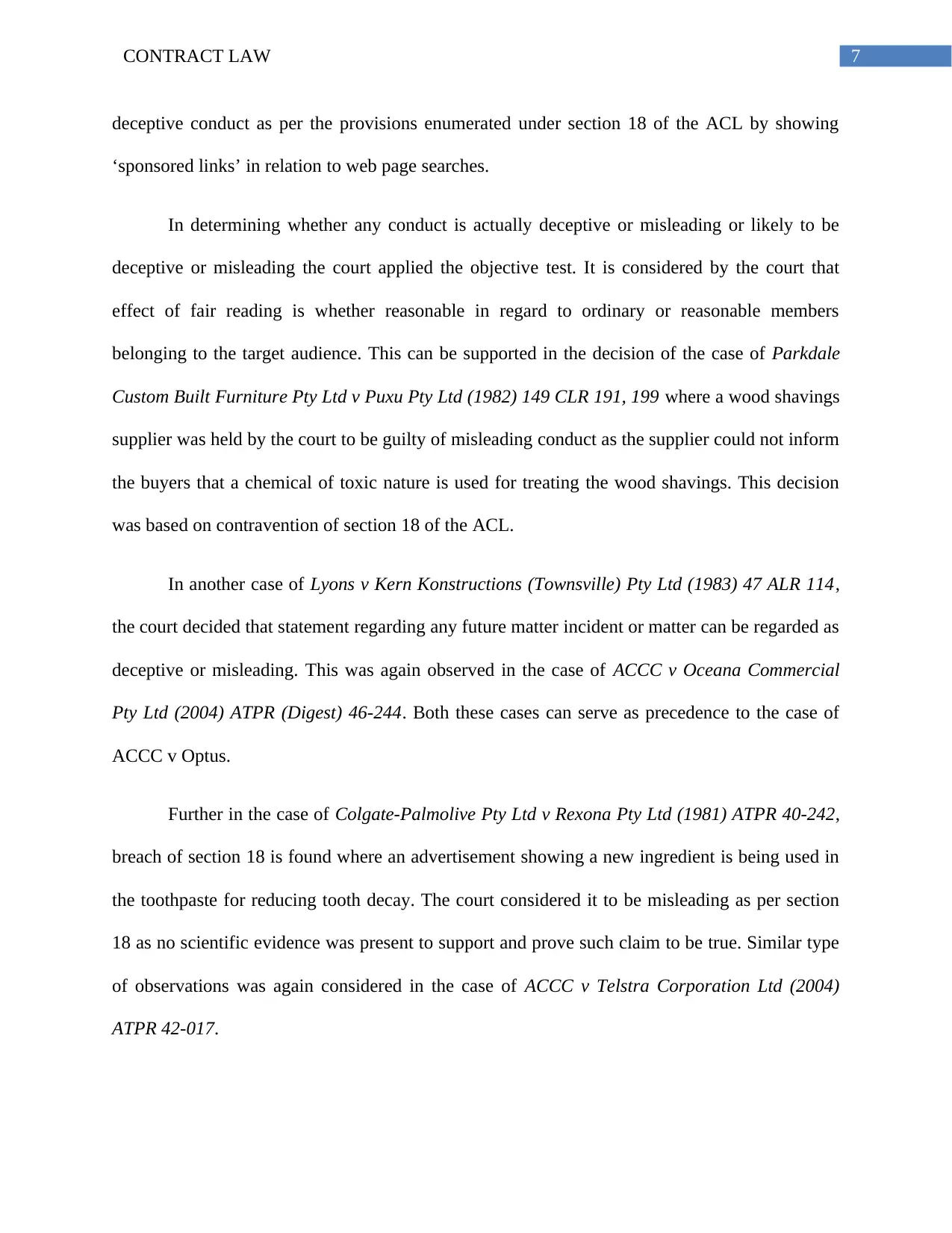
7CONTRACT LAW
deceptive conduct as per the provisions enumerated under section 18 of the ACL by showing
‘sponsored links’ in relation to web page searches.
In determining whether any conduct is actually deceptive or misleading or likely to be
deceptive or misleading the court applied the objective test. It is considered by the court that
effect of fair reading is whether reasonable in regard to ordinary or reasonable members
belonging to the target audience. This can be supported in the decision of the case of Parkdale
Custom Built Furniture Pty Ltd v Puxu Pty Ltd (1982) 149 CLR 191, 199 where a wood shavings
supplier was held by the court to be guilty of misleading conduct as the supplier could not inform
the buyers that a chemical of toxic nature is used for treating the wood shavings. This decision
was based on contravention of section 18 of the ACL.
In another case of Lyons v Kern Konstructions (Townsville) Pty Ltd (1983) 47 ALR 114,
the court decided that statement regarding any future matter incident or matter can be regarded as
deceptive or misleading. This was again observed in the case of ACCC v Oceana Commercial
Pty Ltd (2004) ATPR (Digest) 46-244. Both these cases can serve as precedence to the case of
ACCC v Optus.
Further in the case of Colgate-Palmolive Pty Ltd v Rexona Pty Ltd (1981) ATPR 40-242,
breach of section 18 is found where an advertisement showing a new ingredient is being used in
the toothpaste for reducing tooth decay. The court considered it to be misleading as per section
18 as no scientific evidence was present to support and prove such claim to be true. Similar type
of observations was again considered in the case of ACCC v Telstra Corporation Ltd (2004)
ATPR 42-017.
deceptive conduct as per the provisions enumerated under section 18 of the ACL by showing
‘sponsored links’ in relation to web page searches.
In determining whether any conduct is actually deceptive or misleading or likely to be
deceptive or misleading the court applied the objective test. It is considered by the court that
effect of fair reading is whether reasonable in regard to ordinary or reasonable members
belonging to the target audience. This can be supported in the decision of the case of Parkdale
Custom Built Furniture Pty Ltd v Puxu Pty Ltd (1982) 149 CLR 191, 199 where a wood shavings
supplier was held by the court to be guilty of misleading conduct as the supplier could not inform
the buyers that a chemical of toxic nature is used for treating the wood shavings. This decision
was based on contravention of section 18 of the ACL.
In another case of Lyons v Kern Konstructions (Townsville) Pty Ltd (1983) 47 ALR 114,
the court decided that statement regarding any future matter incident or matter can be regarded as
deceptive or misleading. This was again observed in the case of ACCC v Oceana Commercial
Pty Ltd (2004) ATPR (Digest) 46-244. Both these cases can serve as precedence to the case of
ACCC v Optus.
Further in the case of Colgate-Palmolive Pty Ltd v Rexona Pty Ltd (1981) ATPR 40-242,
breach of section 18 is found where an advertisement showing a new ingredient is being used in
the toothpaste for reducing tooth decay. The court considered it to be misleading as per section
18 as no scientific evidence was present to support and prove such claim to be true. Similar type
of observations was again considered in the case of ACCC v Telstra Corporation Ltd (2004)
ATPR 42-017.
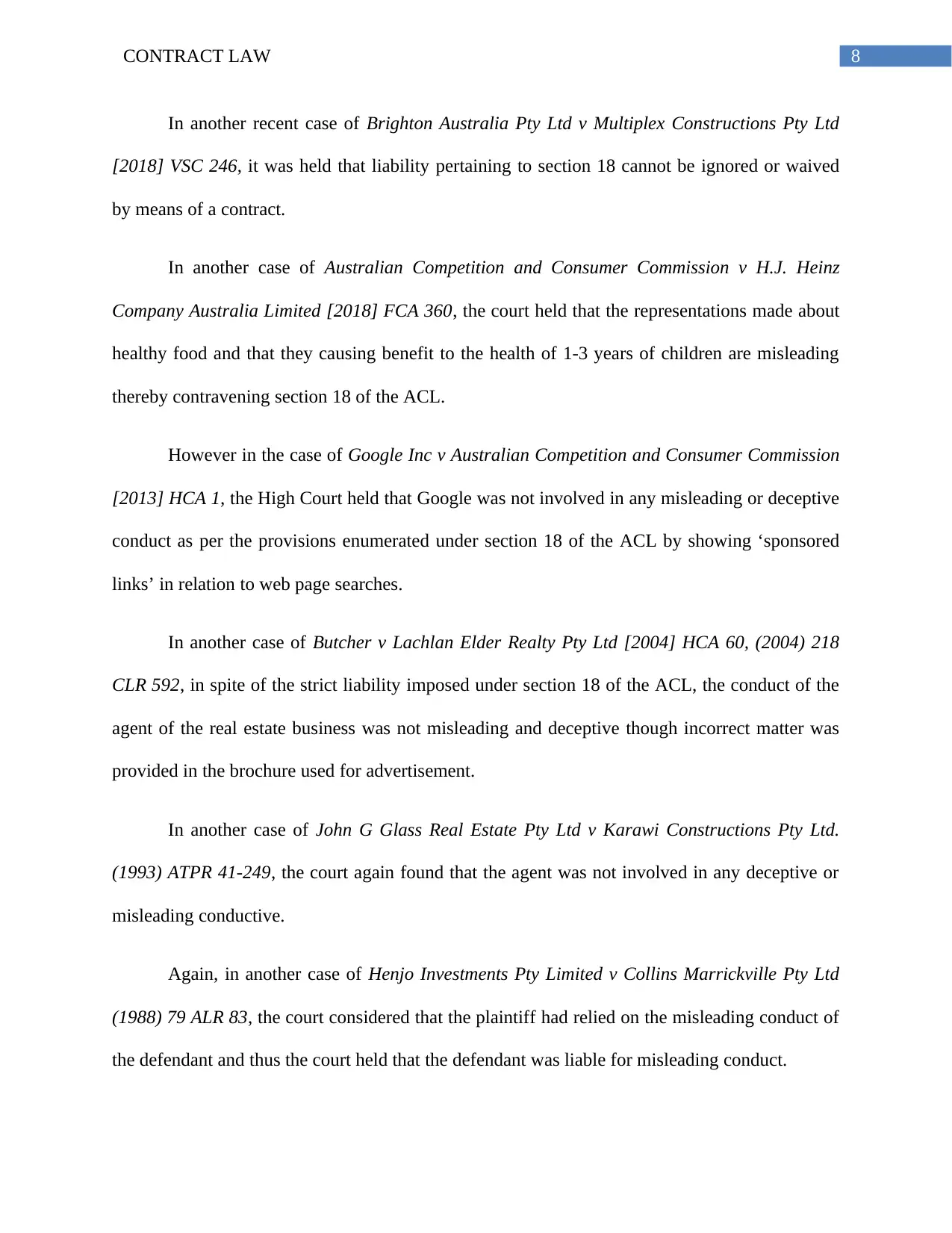
8CONTRACT LAW
In another recent case of Brighton Australia Pty Ltd v Multiplex Constructions Pty Ltd
[2018] VSC 246, it was held that liability pertaining to section 18 cannot be ignored or waived
by means of a contract.
In another case of Australian Competition and Consumer Commission v H.J. Heinz
Company Australia Limited [2018] FCA 360, the court held that the representations made about
healthy food and that they causing benefit to the health of 1-3 years of children are misleading
thereby contravening section 18 of the ACL.
However in the case of Google Inc v Australian Competition and Consumer Commission
[2013] HCA 1, the High Court held that Google was not involved in any misleading or deceptive
conduct as per the provisions enumerated under section 18 of the ACL by showing ‘sponsored
links’ in relation to web page searches.
In another case of Butcher v Lachlan Elder Realty Pty Ltd [2004] HCA 60, (2004) 218
CLR 592, in spite of the strict liability imposed under section 18 of the ACL, the conduct of the
agent of the real estate business was not misleading and deceptive though incorrect matter was
provided in the brochure used for advertisement.
In another case of John G Glass Real Estate Pty Ltd v Karawi Constructions Pty Ltd.
(1993) ATPR 41-249, the court again found that the agent was not involved in any deceptive or
misleading conductive.
Again, in another case of Henjo Investments Pty Limited v Collins Marrickville Pty Ltd
(1988) 79 ALR 83, the court considered that the plaintiff had relied on the misleading conduct of
the defendant and thus the court held that the defendant was liable for misleading conduct.
In another recent case of Brighton Australia Pty Ltd v Multiplex Constructions Pty Ltd
[2018] VSC 246, it was held that liability pertaining to section 18 cannot be ignored or waived
by means of a contract.
In another case of Australian Competition and Consumer Commission v H.J. Heinz
Company Australia Limited [2018] FCA 360, the court held that the representations made about
healthy food and that they causing benefit to the health of 1-3 years of children are misleading
thereby contravening section 18 of the ACL.
However in the case of Google Inc v Australian Competition and Consumer Commission
[2013] HCA 1, the High Court held that Google was not involved in any misleading or deceptive
conduct as per the provisions enumerated under section 18 of the ACL by showing ‘sponsored
links’ in relation to web page searches.
In another case of Butcher v Lachlan Elder Realty Pty Ltd [2004] HCA 60, (2004) 218
CLR 592, in spite of the strict liability imposed under section 18 of the ACL, the conduct of the
agent of the real estate business was not misleading and deceptive though incorrect matter was
provided in the brochure used for advertisement.
In another case of John G Glass Real Estate Pty Ltd v Karawi Constructions Pty Ltd.
(1993) ATPR 41-249, the court again found that the agent was not involved in any deceptive or
misleading conductive.
Again, in another case of Henjo Investments Pty Limited v Collins Marrickville Pty Ltd
(1988) 79 ALR 83, the court considered that the plaintiff had relied on the misleading conduct of
the defendant and thus the court held that the defendant was liable for misleading conduct.
⊘ This is a preview!⊘
Do you want full access?
Subscribe today to unlock all pages.

Trusted by 1+ million students worldwide
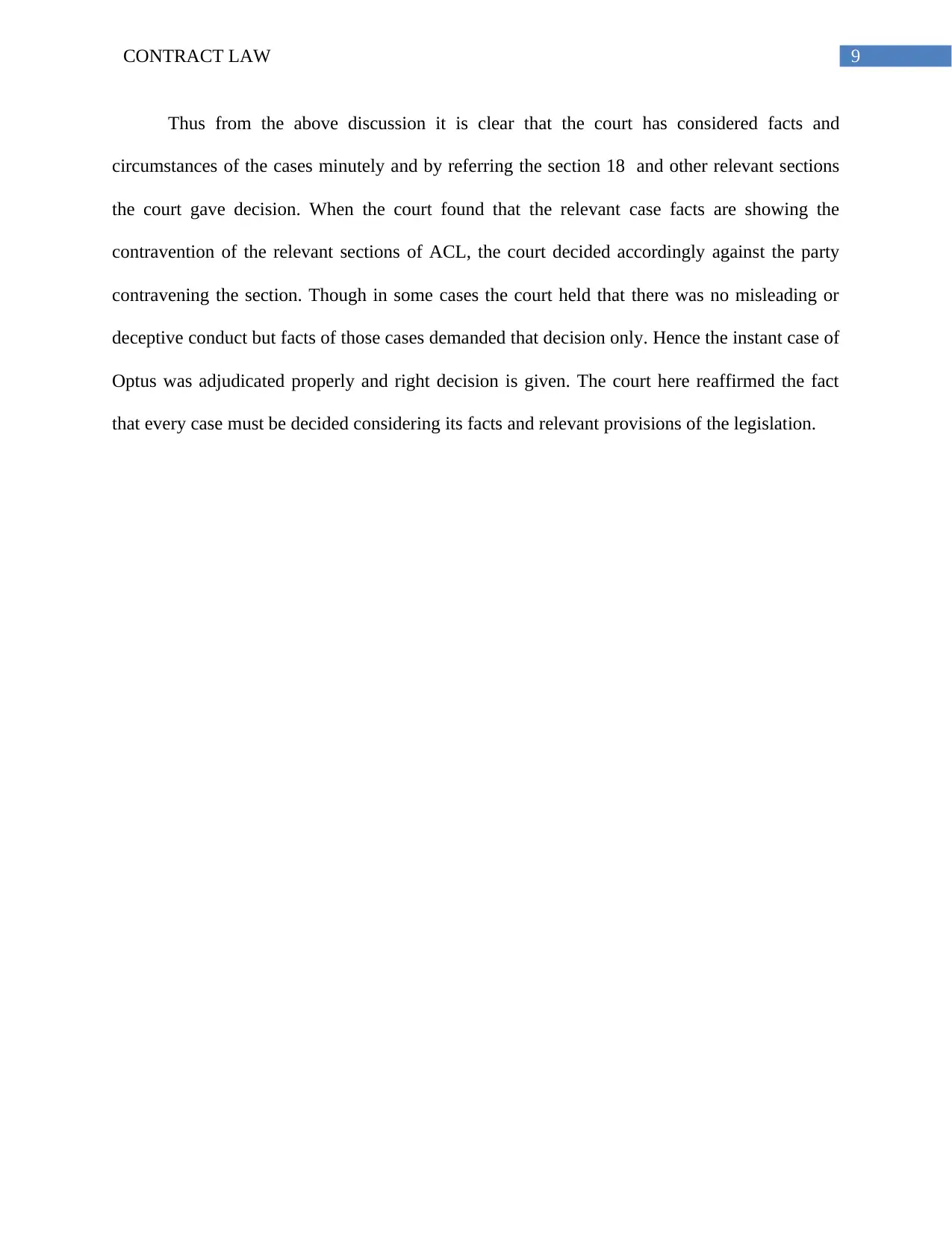
9CONTRACT LAW
Thus from the above discussion it is clear that the court has considered facts and
circumstances of the cases minutely and by referring the section 18 and other relevant sections
the court gave decision. When the court found that the relevant case facts are showing the
contravention of the relevant sections of ACL, the court decided accordingly against the party
contravening the section. Though in some cases the court held that there was no misleading or
deceptive conduct but facts of those cases demanded that decision only. Hence the instant case of
Optus was adjudicated properly and right decision is given. The court here reaffirmed the fact
that every case must be decided considering its facts and relevant provisions of the legislation.
Thus from the above discussion it is clear that the court has considered facts and
circumstances of the cases minutely and by referring the section 18 and other relevant sections
the court gave decision. When the court found that the relevant case facts are showing the
contravention of the relevant sections of ACL, the court decided accordingly against the party
contravening the section. Though in some cases the court held that there was no misleading or
deceptive conduct but facts of those cases demanded that decision only. Hence the instant case of
Optus was adjudicated properly and right decision is given. The court here reaffirmed the fact
that every case must be decided considering its facts and relevant provisions of the legislation.
Paraphrase This Document
Need a fresh take? Get an instant paraphrase of this document with our AI Paraphraser
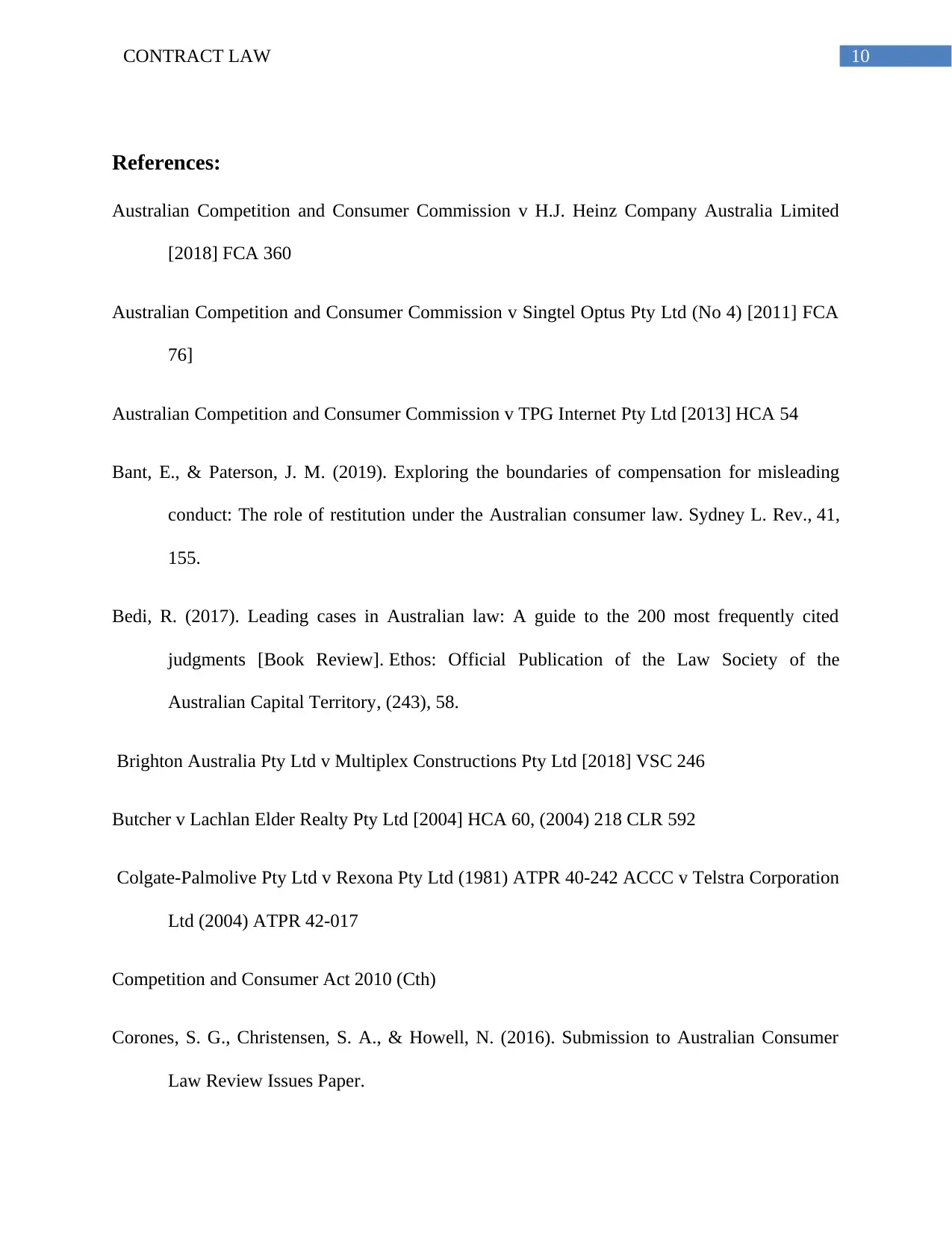
10CONTRACT LAW
References:
Australian Competition and Consumer Commission v H.J. Heinz Company Australia Limited
[2018] FCA 360
Australian Competition and Consumer Commission v Singtel Optus Pty Ltd (No 4) [2011] FCA
76]
Australian Competition and Consumer Commission v TPG Internet Pty Ltd [2013] HCA 54
Bant, E., & Paterson, J. M. (2019). Exploring the boundaries of compensation for misleading
conduct: The role of restitution under the Australian consumer law. Sydney L. Rev., 41,
155.
Bedi, R. (2017). Leading cases in Australian law: A guide to the 200 most frequently cited
judgments [Book Review]. Ethos: Official Publication of the Law Society of the
Australian Capital Territory, (243), 58.
Brighton Australia Pty Ltd v Multiplex Constructions Pty Ltd [2018] VSC 246
Butcher v Lachlan Elder Realty Pty Ltd [2004] HCA 60, (2004) 218 CLR 592
Colgate-Palmolive Pty Ltd v Rexona Pty Ltd (1981) ATPR 40-242 ACCC v Telstra Corporation
Ltd (2004) ATPR 42-017
Competition and Consumer Act 2010 (Cth)
Corones, S. G., Christensen, S. A., & Howell, N. (2016). Submission to Australian Consumer
Law Review Issues Paper.
References:
Australian Competition and Consumer Commission v H.J. Heinz Company Australia Limited
[2018] FCA 360
Australian Competition and Consumer Commission v Singtel Optus Pty Ltd (No 4) [2011] FCA
76]
Australian Competition and Consumer Commission v TPG Internet Pty Ltd [2013] HCA 54
Bant, E., & Paterson, J. M. (2019). Exploring the boundaries of compensation for misleading
conduct: The role of restitution under the Australian consumer law. Sydney L. Rev., 41,
155.
Bedi, R. (2017). Leading cases in Australian law: A guide to the 200 most frequently cited
judgments [Book Review]. Ethos: Official Publication of the Law Society of the
Australian Capital Territory, (243), 58.
Brighton Australia Pty Ltd v Multiplex Constructions Pty Ltd [2018] VSC 246
Butcher v Lachlan Elder Realty Pty Ltd [2004] HCA 60, (2004) 218 CLR 592
Colgate-Palmolive Pty Ltd v Rexona Pty Ltd (1981) ATPR 40-242 ACCC v Telstra Corporation
Ltd (2004) ATPR 42-017
Competition and Consumer Act 2010 (Cth)
Corones, S. G., Christensen, S. A., & Howell, N. (2016). Submission to Australian Consumer
Law Review Issues Paper.
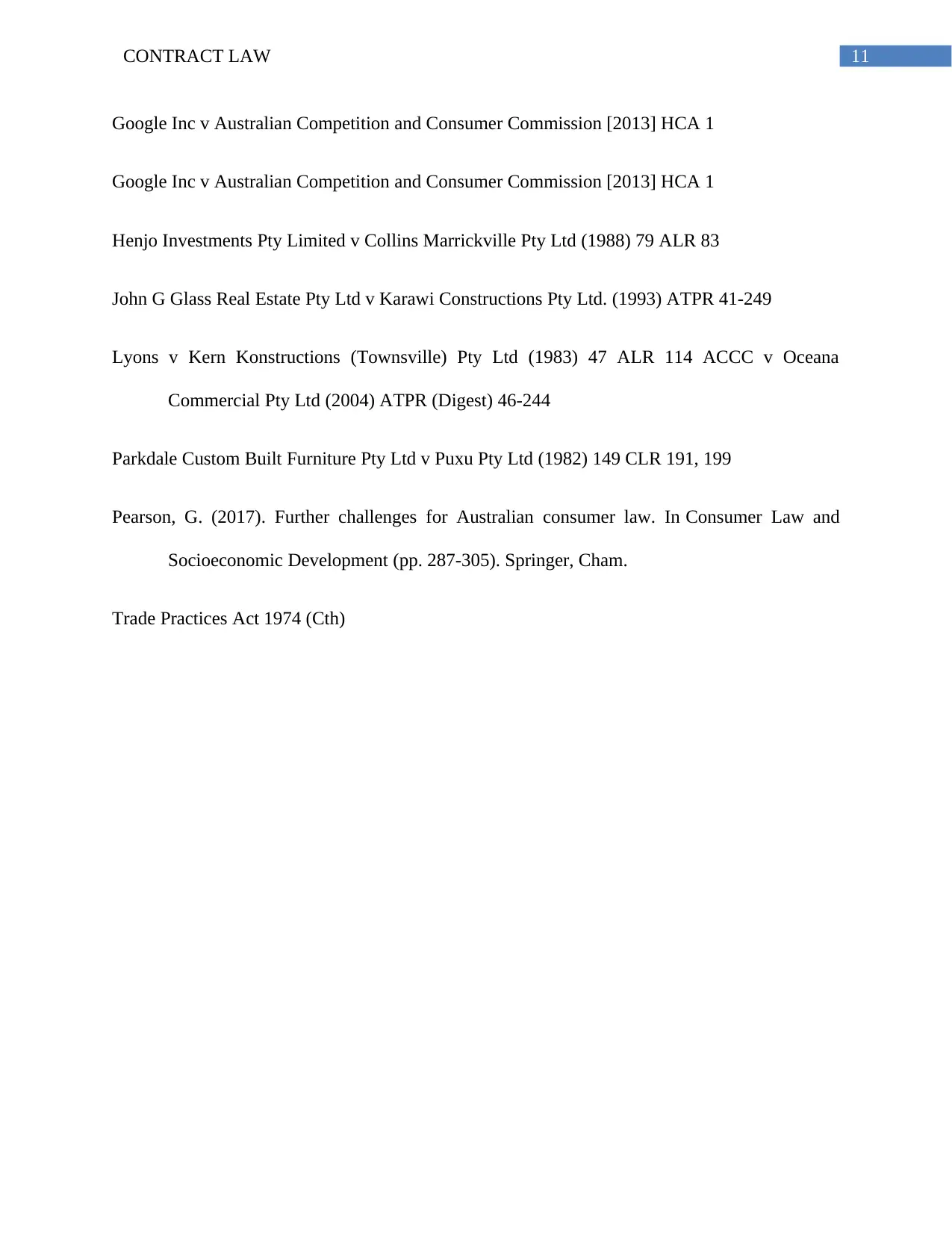
11CONTRACT LAW
Google Inc v Australian Competition and Consumer Commission [2013] HCA 1
Google Inc v Australian Competition and Consumer Commission [2013] HCA 1
Henjo Investments Pty Limited v Collins Marrickville Pty Ltd (1988) 79 ALR 83
John G Glass Real Estate Pty Ltd v Karawi Constructions Pty Ltd. (1993) ATPR 41-249
Lyons v Kern Konstructions (Townsville) Pty Ltd (1983) 47 ALR 114 ACCC v Oceana
Commercial Pty Ltd (2004) ATPR (Digest) 46-244
Parkdale Custom Built Furniture Pty Ltd v Puxu Pty Ltd (1982) 149 CLR 191, 199
Pearson, G. (2017). Further challenges for Australian consumer law. In Consumer Law and
Socioeconomic Development (pp. 287-305). Springer, Cham.
Trade Practices Act 1974 (Cth)
Google Inc v Australian Competition and Consumer Commission [2013] HCA 1
Google Inc v Australian Competition and Consumer Commission [2013] HCA 1
Henjo Investments Pty Limited v Collins Marrickville Pty Ltd (1988) 79 ALR 83
John G Glass Real Estate Pty Ltd v Karawi Constructions Pty Ltd. (1993) ATPR 41-249
Lyons v Kern Konstructions (Townsville) Pty Ltd (1983) 47 ALR 114 ACCC v Oceana
Commercial Pty Ltd (2004) ATPR (Digest) 46-244
Parkdale Custom Built Furniture Pty Ltd v Puxu Pty Ltd (1982) 149 CLR 191, 199
Pearson, G. (2017). Further challenges for Australian consumer law. In Consumer Law and
Socioeconomic Development (pp. 287-305). Springer, Cham.
Trade Practices Act 1974 (Cth)
⊘ This is a preview!⊘
Do you want full access?
Subscribe today to unlock all pages.

Trusted by 1+ million students worldwide
1 out of 12
Related Documents
Your All-in-One AI-Powered Toolkit for Academic Success.
+13062052269
info@desklib.com
Available 24*7 on WhatsApp / Email
![[object Object]](/_next/static/media/star-bottom.7253800d.svg)
Unlock your academic potential
Copyright © 2020–2026 A2Z Services. All Rights Reserved. Developed and managed by ZUCOL.





